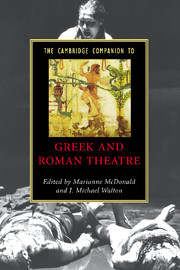Book contents
- Frontmatter
- Introduction
- PART I: TEXT IN CONTEXT
- PART II: THE NATURE OF PERFORMANCE
- 9 Art and theatre in the ancient world
- 10 Festivals and audiences in Athens and Rome
- 11 Playing places: the temporary and the permanent
- 12 Chorus and dance in the ancient world
- 13 Masks in Greek and Roman theatre
- 14 A material world: costume, properties and scenic effects
- 15 Commodity: asking the wrong questions
- 16 The dramatic legacy of myth: Oedipus in opera, radio, television and film
- Playwrights and plays
- Glossary of Greek and Latin words and terms
- Select bibliography
- Index
13 - Masks in Greek and Roman theatre
from PART II: - THE NATURE OF PERFORMANCE
Published online by Cambridge University Press: 28 January 2009
- Frontmatter
- Introduction
- PART I: TEXT IN CONTEXT
- PART II: THE NATURE OF PERFORMANCE
- 9 Art and theatre in the ancient world
- 10 Festivals and audiences in Athens and Rome
- 11 Playing places: the temporary and the permanent
- 12 Chorus and dance in the ancient world
- 13 Masks in Greek and Roman theatre
- 14 A material world: costume, properties and scenic effects
- 15 Commodity: asking the wrong questions
- 16 The dramatic legacy of myth: Oedipus in opera, radio, television and film
- Playwrights and plays
- Glossary of Greek and Latin words and terms
- Select bibliography
- Index
Summary
We know with certainty that the mask was an essential feature of theatrical performance in ancient Greece and Rome.
We are frustrated by the paucity of evidence relating to why it was adopted and how it functioned.
We are encouraged by the fact that, like the actors of old, we can don similar masks and learn from the experience of performing in them something about their use and significance in the ancient theatres.
Over a period of fifteen years, I conducted a series of productions and workshops of tragedy and comedy with a view to discovering what we might learn through performance. Specifically, each production was designed to test certain hypotheses about theatrical performance in ancient Greece. It was clearly understood that it was impossible to recreate the original productions or their context. But particular aspects of those performances could be tested in isolation.
The tragedies and comedies performed or workshopped in whole or in part were Sophocles' Oedipus Tyrannus, Oedipus at Colonus, Antigone, Philoctetes and Ajax; Euripides' Medea and Bacchae, Aristophanes' Women at the Thesmophoria and Lysistrata and the lyrical Homeric Hymn to Demeter.
- Type
- Chapter
- Information
- The Cambridge Companion to Greek and Roman Theatre , pp. 247 - 267Publisher: Cambridge University PressPrint publication year: 2007
- 5
- Cited by

